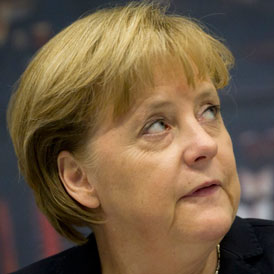Angela Merkel ‘out of her depth’
As EU leaders meet in Brussels to agree a debt rescue deal, Channel 4 News is told that Germans believe Chancellor Angela Merkel is “out of her depth”.

Matthias Thibaut, London correspondent for the German newspaper, Tagesspiegel, said Ms Merkel should have been more candid with voters at the beginning of the crisis.
“The impression of Germans is that politicians are completely out of their depth. They are promising things and breaking things.” Ms Merkel was not an economist and “by definition, she is out of her depth”. Mr Thibaut said she had been criticised by former chancellors Helmut Schmidt and Helmut Kohl for her handling of the crisis and she was unlikely to win the next election.
The impression of Germans is that politicians are completely out of their depth. Matthias Thibaut, Tagesspiegel
Second World War
He said Germany had to take account of 20th century history in its dealings with other European countries. “Germans are in the lead because they have the money, not because they have the leadership. Germany needs to tread carefully for historical reasons. Germany knows quite well that it has to be careful in taking a leadership role that it doesn’t raise historical ghosts.”
Mr Thibaut said while there was disillusionment with the euro, Germans did not want to see the end of the single currency. “In the end, if it comes to the crunch, Germany is too scared to throw it all out, to destroy the euro.”
- Chapters
- descriptions off, selected
- subtitles off, selected
- captions settings, opens captions settings dialog
- captions off, selected
This is a modal window.
This is a modal window. This modal can be closed by pressing the Escape key or activating the close button.
Brussels summit
As leader of Europe’s strongest economy, Ms Merkel is in a difficult position. Before setting off for the Brussels summit, she sought parliamentary approval for the plan to strengthen the 440bn euro bailout fund, telling members: “If the euro fails, Europe fails.”
There is anxiety in Germany that it could be left footing the bill on behalf of heavily indebted economies, such as Greece and Italy. At last weekend’s emergency summit in Brussels, Ms Merkel set a 26 October deadline to agree a package to resolve the crisis.
This involves the recapitalisation of Europe’s most exposed banks, strengthening the bailout fund and writing off some of Greece’s debts. The bailout fund is the most contentious issue, particularly in Germany.
French demands
France’s President Nicolas Sarkozy had proposed turning the fund into a bank that could borrow money from the European Central Bank (ECB), but Berlin objected and this idea has now been shelved.
Ms Merkel also objects to a proposal for the ECB to buy up troubled eurozone countries’ bonds, and this is also likely to be dropped. “It looks like Germany got its way over France. The phrase will likely not be in the next draft,” a senior eurozone source told Reuters.
Read more: The eurozone crisis that keeps repeating itself